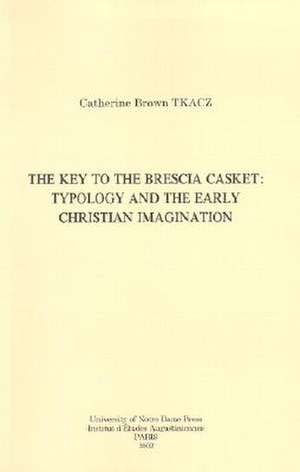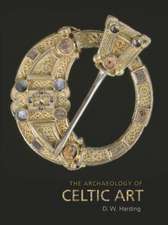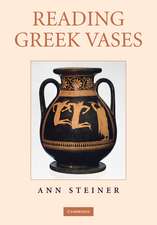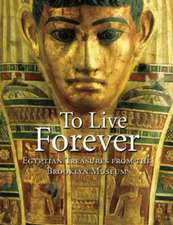The Key to the Brescia Casket – Typology and the Early Christian Imagination: Christianity and Judaism in Antiquity
Autor Catherine Brown Tkaczen Limba Engleză Paperback – 3 mar 2002
he elusive rationale for the Brescia Casket, an ivory reliquary carved in northern Italy ca. 390, has long tantalized scholars. In The Key to the Brescia Casket, Dr. Catherine Brown Tkacz reveals that the secret to its meaning lies in exegetical typology—the interpretation of Old Testament people and events as prefiguring the Messiah. Typology, Tkacz argues, underlies the sophisticated program of the ivory box, which features an unusually full depiction of the Passion.
Among the fifty-nine carvings on the Brescia Casket, most of them depicting biblical events, are five scenes of the Passion, more than any other monument prior to this time period. These are arranged in historical order, which is also rare in fourth-century Christian art. Tkacz contends that the Casket is in effect a visual sermon on the unity of the Bible’s two testaments, an important theological issue of the time.
This wonderfully illustrated and rigorously interdisciplinary volume, funded by a grant from the Samuel H. Kress Foundation, grounds the typological program of the Brescia Casket in fourth-century thought. In so doing, it suggests the real possibility that typology is more important for the understanding of Early Christian art than has previously been appreciated.
Among the fifty-nine carvings on the Brescia Casket, most of them depicting biblical events, are five scenes of the Passion, more than any other monument prior to this time period. These are arranged in historical order, which is also rare in fourth-century Christian art. Tkacz contends that the Casket is in effect a visual sermon on the unity of the Bible’s two testaments, an important theological issue of the time.
This wonderfully illustrated and rigorously interdisciplinary volume, funded by a grant from the Samuel H. Kress Foundation, grounds the typological program of the Brescia Casket in fourth-century thought. In so doing, it suggests the real possibility that typology is more important for the understanding of Early Christian art than has previously been appreciated.
| Toate formatele și edițiile | Preț | Express |
|---|---|---|
| Paperback (1) | 394.59 lei 6-8 săpt. | |
| MR – University of Notre Dame Press – 3 mar 2002 | 394.59 lei 6-8 săpt. | |
| Hardback (1) | 589.97 lei 6-8 săpt. | |
| MR – University of Notre Dame Press – 31 ian 2001 | 589.97 lei 6-8 săpt. |
Preț: 394.59 lei
Nou
Puncte Express: 592
Preț estimativ în valută:
75.54€ • 78.82$ • 63.32£
75.54€ • 78.82$ • 63.32£
Carte tipărită la comandă
Livrare economică 12-26 martie
Preluare comenzi: 021 569.72.76
Specificații
ISBN-13: 9780268012311
ISBN-10: 0268012318
Pagini: 282
Ilustrații: 30 halftones
Dimensiuni: 152 x 229 x 15 mm
Greutate: 0.48 kg
Ediția:1
Editura: MR – University of Notre Dame Press
Seria Christianity and Judaism in Antiquity
ISBN-10: 0268012318
Pagini: 282
Ilustrații: 30 halftones
Dimensiuni: 152 x 229 x 15 mm
Greutate: 0.48 kg
Ediția:1
Editura: MR – University of Notre Dame Press
Seria Christianity and Judaism in Antiquity
Recenzii
“H]elpful to both the specialized scholar as well as someone new to the subject.... [T]he book reflects a growing acknowledgment among scholars that there existed a close affinity between theological ideas and artistic representation in the early Christian world.” —Religious Studies Review, January 2003
“Art historians have, for the first time, an encyclopedic treatment of this reliquary, to which critics today assign pride of place among early Christian ivory carvings. In chapter one the reader is provided with descriptions and pictures of all the carved surfaces, and an ingenious appendix Table of Identifications repeats all thirty-three registers, the fifteen extant medallions, and all nine panels and locates each in its proper site on a sketch of the casket. The comprehensiveness and the design of this appendix make it more satisfactory for study than a visit to the Museo Civico in Brescia where the casket is displayed.” —The Heythrop Journal
Notă biografică
Catherine Brown Tkacz is the first woman to earn the PhD in medieval studies at the University of Notre Dame. She has often lectured on biblical studies and theology, especially at Blackfriars in Oxford and the Ukrainian Catholic University in L'viv. Her over 130 publications include her fourth book, Women as Types of Christ, East and West. Pope Francis has appointed her to his new commission for the study of women and the diaconate. Douglas Kries is Professor of Philosophy at Gonzaga University, where he researches in political philosophy, including the political thought of St. Augustine. Among his works are The Problem of Natural Law and (with Ernest L. Fortin and Michael W. Tkacz) Augustine: Political Writings. He has previously collaborated with Catherine Brown Tkacz as co-editor of Nova Doctrina Vetusque: Essays on Early Christianity in Honor of Fredric W. Schlatter, S.J.






















